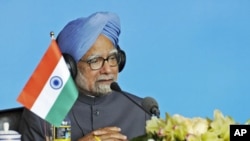For the first time in 80 years, India is planning a detailed survey of religious and caste affiliation. Castes in India are part of a traditional Hindu system of social categorization and are believed to have an impact on the economic fortunes of the population. Leaders say having detailed caste data can help them better target social programs.
The Indian cabinet approved the caste census Thursday, although the exact process for carrying it out still needs to be negotiated.
Broadly, Indian officials plan to distribute questionnaires about caste and religious affiliation during June and July, alongside efforts to count those Indians who are living below a government-set poverty line.
This is the first concrete plan by the Indian government to collect caste affiliation data since 1931, prior to the country's independence from the British.
N. Bhaskara Rao is one of India's most experienced and respected demographic researchers. He says the caste survey has two well-intentioned aims.
“One is to establish a more reliable estimate," he said. "The second is, those who are not represented, those who have not yet gotten on to the power structure - to bring them into the fold of power.”
Ancient Hindu scripture outlines four basic social classifications, along with a fifth class of so-called “untouchables,” now known as Dalits, who were at the bottom of the hierarchy and traditionally performed society's most menial jobs. The reality is far more complex, with thousands of sub-groupings weaving an intricate hierarchy of socially perceived roles.
India's post-independence constitution set a goal of eliminating caste-based discrimination. Modern Indian governments have taken a more practical approach - seeking to target job quotas, food subsidies, and other social programs at lower-caste Indians. Supporters of a caste census says the data it generates will be crucial in tailoring such programs. They also believe it will provide a scientific overview of the link between caste and economic destiny.
Rao, however, cautions that new caste data may open a “Pandora's box” of new jostling among different groups for government handouts.
“There are communities who want to establish that, 'please - recognize my community to be eligible to get a seat on a priority basis, or to get an employment on a priority basis, get a public distribution of 25 kilograms of rice, or wheat, free or at a subsidized price - because I belong to this caste,'” he said.
Rao also warns the caste census may be just as vulnerable to corruption as the rest of the Indian political system. He says factional leaders may seek to bribe local populations into falsely claiming membership of a given caste, in order to increase that leader's leverage with the central government.
Indian Government Approves First 'Caste Census' in 80 Years
- By Kurt Achin




